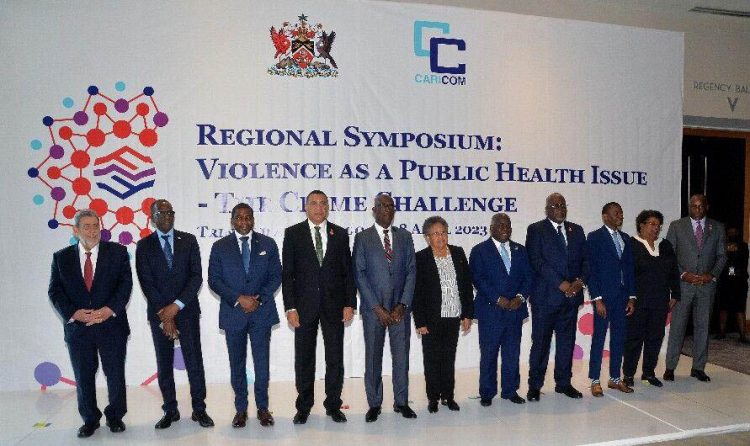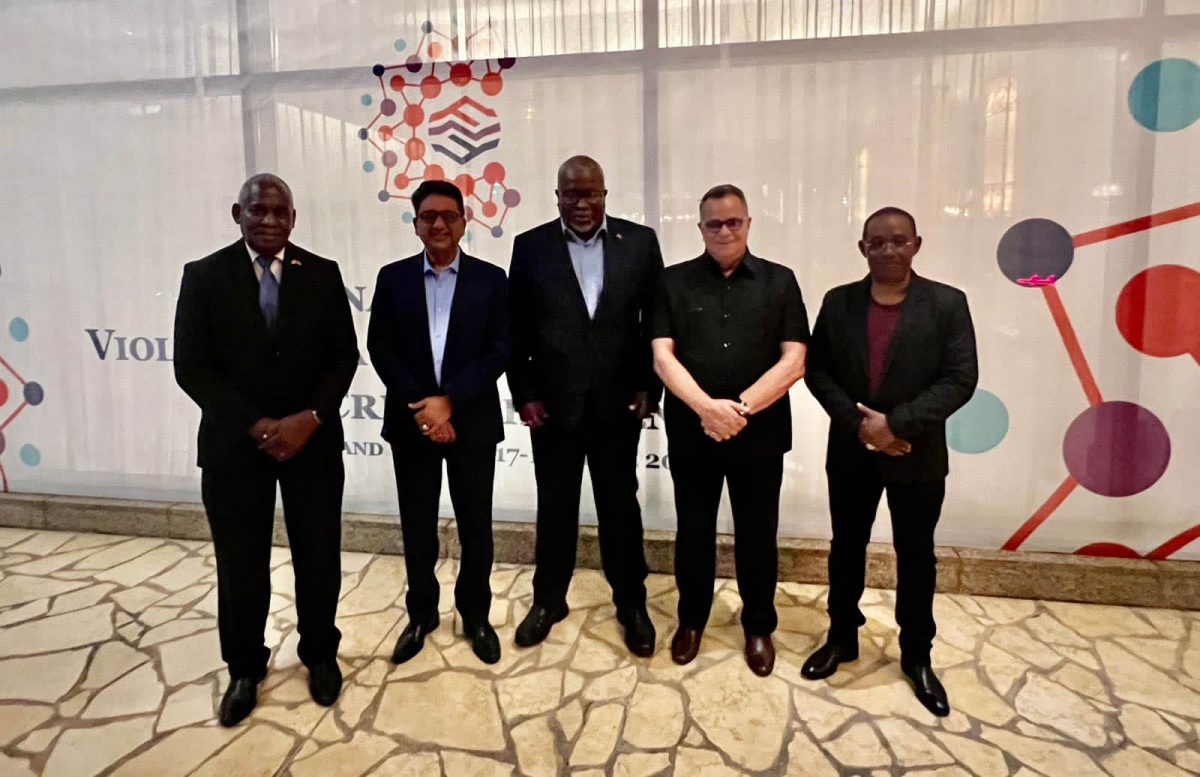In a dramatic escalation in the battle against firearms which will put it at odds with the United States, CARICOM Heads meeting in Trinidad and Tobago yesterday declared a war on guns.
They issued the following declaration:
“We the Heads of Government of the Caribbean Community (CARICOM) meeting in Port of Spain, Trinidad and Tobago on April 17-18, 2023, on the occasion of the Regional Symposium to address Crime and Violence as a public health issue, register our grave concern at the increase in the illegal exportation of guns from the United States of America which is a direct threat to our democracy.

“We declare a War on Guns to combat the illegal trade which provides the weapons that contribute significantly to crime and violence in our Region causing death, disabilities and compromising the safety of our citizens.
“We call on the United States of America to join the Caribbean in our War on Guns and urgently adopt and take action to stop the illegal exportation of firearms and ammunition into the Caribbean.
“We lament the disproportionate share of our national budgets that we are compelled to allocate to measures to address crime, violence and national security as well as mental health and other health-related challenges, that directly result from the illegal exportation of guns to our region.
“We underscore our commitment to utilize all human, financial and other resources to rid our Region of the scourge of illicit weapons”.
During the two days of deliberations the United States was criticised for not doing enough to stem the flow of illicit arms into the Caribbean.
Guyana was represented at the meeting by Prime Minister, Mark Phillips; Minister of Home Affairs Robeson Benn and Attorney General Anil Nandlall.
Some CARICOM states had last month signalled that their impatience with Washington over this issue had expired.
On March 21st Antigua and Barbuda, Belize, The Bahamas, Jamaica and Trinidad and Tobago joined an amicus curiae brief in Mexico’s appeal in a civil lawsuit against US gun manufacturers. Sixteen US states also filed an amicus curiae brief, according to Reuters. Mexico City is seeking to hold U.S. gun makers responsible for facilitating the trafficking of deadly weapons across the border.
Yesterday, the CARICOM Heads also issued a declaration underlining their intent on cracking down on illegal firearms and upping the pressure against Washington.
The preamble recognised that the epidemic of crime and violence in the Caribbean, fueled by illegal guns and organized criminal gangs, posed a threat to democracy and the stability of regional societies.
Deeply concerned at the high rate of illegal exportation of guns from the United States of America to the Caribbean Region, the Heads recalled the Region’s strong and enduring investments to support the United States in its ‘War on Drugs’.
“…given our observation that the gun has become the new drug, as articulated in our separate 18 April 2023 Declaration, we call on the United States of America to reciprocate and join the Caribbean in its ‘War on Guns’.
The Heads further vowed to undertake a comprehensive overhaul of the criminal justice system to address criminal terrorists with a focus on proactive management of prosecutions, sentencing and the diversion of young people at risk.
They also pledged to “strengthen regional forensic capabilities and collaboration among national forensic agencies with a view to improving the quality of evidence and speed the conduct of trials;
“Prepare regional model legislation to bring greater harmonization and efficiency to the development and revision of national laws;
“Immediately and effectively implement the CARICOM Arrest Warrant Treaty;
“Augment the jurisdiction of magistrates, the consideration of defendants’ options to judge-only trials, and the intra-regional rotation of judges and magistrates to admit or foster their greater exposure”.
The Heads also agreed to ban assault weapons in the region, except for the security forces and sporting competitions and vowed to stand with Mexico on its legal action against US gun manufacturers and retailers.
They will also establish an entity under IMPACS to assist in the containment of corruption and financial crimes, including money laundering and cybercrimes, through greater collaboration to harmonise related legislation and operational processes.
They also agreed to appoint an Eminent Person to lead and advise Heads and the Secretariat on further strategies and reforms and on effectively operationalizing the decisions of Heads.
Judiciary
The Trinidad Express reported yesterday that St Vincent and the Grenadines Prime Minister Ralph Gonsalves on Monday criticised members of the judiciary who grant bail to murder accused, asking whether they lived on Mars.
Contributing to the Prime Ministers’ roundtable discussion at the Regional Symposium: Violence as a Public Health Issue – The Caricom Challenge at the Hyatt Regency hotel in Port of Spain, Gonsalves also said the Pope and the Roman Catholic church were wrong for opposing the death penalty. He said people in the “taverns” all over the region wanted the death penalty to be carried out.
On the issue of the death penalty, Gonsalves said: “I am a Roman Catholic. The Roman Catholic church says we shouldn’t have the death penalty. My mother was a Legion of Mary and she taught me that you shouldn’t have the death penalty. I happen to think that both my mother and the Pope are wrong. For murder, other than a crime of passion, you should get the death penalty. And if the Europeans don’t like that… they had it for a long time…and they may not want to bring it back…If we (could) have that (the death penalty) as a particular option for punishment and for the courts not to make it virtually impossible to carry out the death penalty,” he said. He said what he was saying was what people in the taverns in Trinidad and Tobago and in Barbados and in all Caricom countries in the region were saying.
On the issue of the judiciary, Gonsalves said: “Too many of our judges and magistrates are too soft. Sometimes you get the impression that some magistrates, depending on who is the lawyer, their clients seem to get better treatment.
Everybody talking about this, yuh know, but they talking about it behind closed doors. You don’t hear it from a Prime Minister. Well, let us begin to talk about these things too because all of these matters touch on how we are going to address this question.”
He said Caricom countries had put a lot of resources into the police, into crime-fighting, into the judiciary, into prosecutions. He said the region’s laws needed to be updated in defence of public order and safety. “I am not calling for any totalitarian measure but in aspects of our judiciary there is a creeping lack of awareness as to some of the problems we face.
How could you go and give somebody who is charged with murder, bail? Let’s be serious! …Where do those judges live? On Mars?” he said.
Opposition politicians criticised Gonsalves was also critical of Opposition politicians, the Trinidad Express reported.
He said around the region Opposition parties were saying “I want to work with you in dealing with crime” but “don’t believe that at all. The Opposition parties are interested in the following things — to oppose, to expose, and to depose constitutionally. They don’t have anything to propose….They can fool other people, they not fooling me. I am too long in this game to be fooled with these kinds of considerations….The last thing you need to want to help you with this (challenge) is an Opposition politician who wants to get involved with you to try to undermine you in doing your work to make the place safer”.
He said he had no doubt that some of the offenders had mental health challenges, but “in these dysfunctional and broken families, the father is not around, the mother is hustling, trying to make a living and when the boy is 14 and she can no longer control him, she said it’s Rowley problem and is Ralph’s problem. It is not our problem only, it is all of our problem”.
As he talked about the role of the churches, Gonsalves said, “If (only) they stop trying to frighten us to go to heaven, because of hell. Anytime I go to church they want me to go to heaven by frightening me not to go to hell. They have to begin to preach better in order to get my attention and if they can’t get my attention, how are they going to get young people’s attention?” he asked.
He said the bulk of young males are making citizens proud. He said, however, the media focused on those who were offenders, giving them front page attention, while stories on those youths who were “going to churches, involving themselves in the community and taking advantage of opportunities” were put “on Page 40, continued on Page 48”.
According to the Trinidad Express, he said youths turn to violence and gun-related crime in order to maintain “rank” in the community. “They associate with women, in some cases beautiful women who are high maintenance, and they have to rob and steal and kill and deal with drugs in order to maintain them. Everybody here knows what I am talking about is the absolute truth,” he said, adding that the symposium had to be honest.
Stating that nobody killed someone because they were frustrated, Gonsalves said the young males who commit violent crimes were cowardly, greedy and had an insatiable and permanent condition, known as dissatisfaction. “They are absorbed with me, me, me. It is an individualism which has grown in our society as a whole and the material base for it is ‘dog-eat-dog’ capitalism,” he said.
Gonsalves said governments had to learn to communicate effectively with the youth, particularly the young males and governments had to use the cultural artistes, the entertainers, the sports personalities and others who are sensible and mature and can help us with this challenge.
Prime Minister Dr Keith Rowley, fifth from left, poses yesterday with Secretary General of the Caribbean Community Dr Carla Barnett, centre, and a group of visiting Caricom leaders and representatives at the Regional Symposium: Violence as a Public Health Issue — The Caricom Challenge, at Hyatt Regency hotel, Wrightson Road, Port of Spain.



